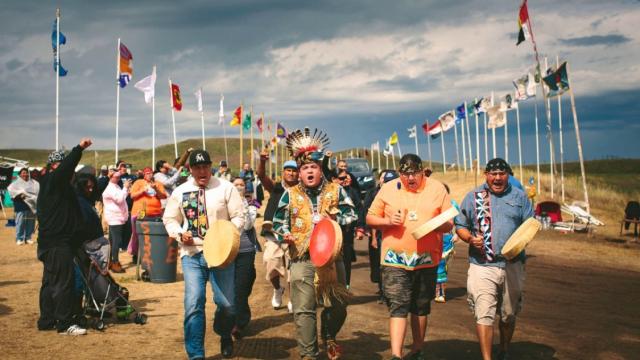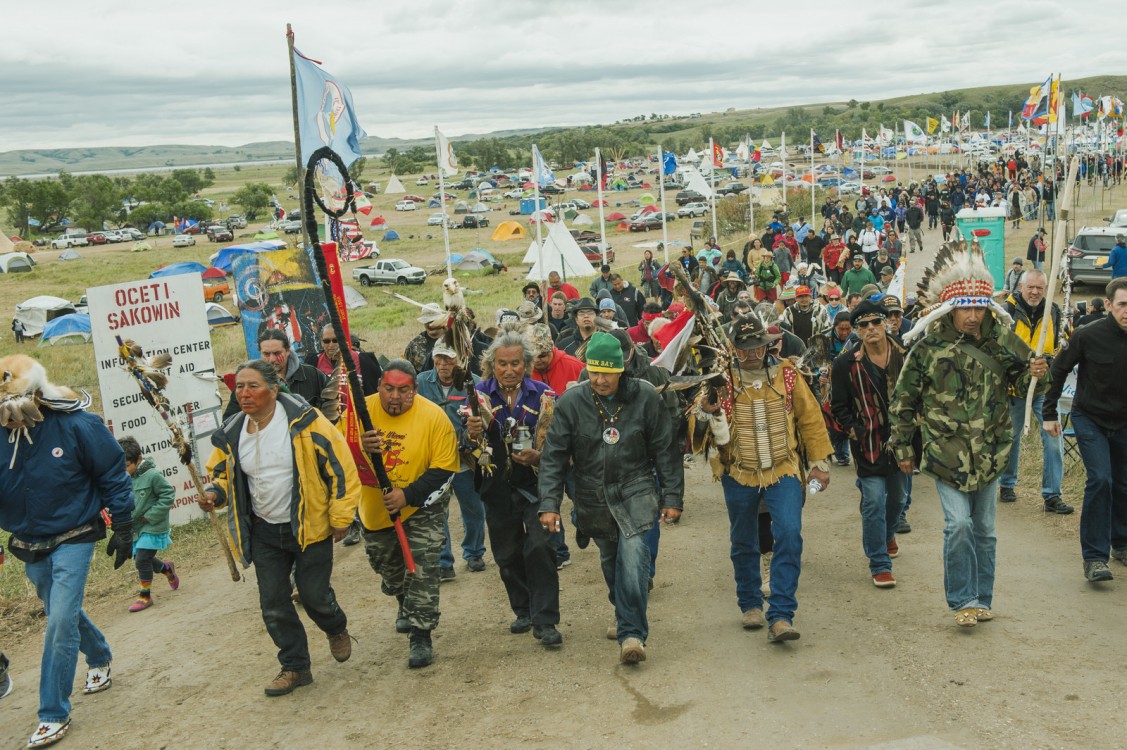
I was in Iraq when President Bush announced the “surge” in January 2007. I was in Afghanistan when President Obama announced the “surge” in December 2009. But it wasn’t until I visited Standing Rock in October 2016 when I actually served the American people. This time, instead of fighting for corporate interests, I was fighting for the people.
The Dakota Access Pipeline (DAPL), or Bakken Pipeline, is a 1,172-mile oil pipeline project that will transfer crude oil across four states: North Dakota, South Dakota, Iowa and Illinois. From the Bakken fields of North Dakota, the pipeline will carry in excess of 450,000 barrels per day of crude oil to Patoka, Illinois, and possibly on to Texas and near the Gulf Coast areas for refinement or export. The project will cost $3.7 billion, while creating 8,000-12,000 temporary construction jobs and only 40 permanent operating jobs.
But I didn’t visit North Dakota to learn about the whopping 40 permanent jobs. I traveled to North Dakota to stand with the people of Standing Rock. The Standing Rock Sioux tribe has called people across this nation and around the world to prayer, action and support for efforts to stop DAPL or, as the people of Standing Rock call it, the Black Snake. They, along with over 300 other Native American tribes, realize that the pipeline will eventually leak and spill oil into their fresh water supply. A spill into the Missouri River would affect 17 million Americans downstream that depend on the river for their drinking water. The people of Standing Rock are not just fighting to save themselves, they are fighting for tens of millions of others.
The Sioux struggle against the pipeline embraces so many other struggles in this nation. It encompasses struggles against climate catastrophe, a history of breaking treaties with Native Americans, attacks on the right to assemble, assaults on journalists, the militarization of police, and placing corporate profits over human rights.
I traveled to Standing Rock with a small group of members from Veterans For Peace (VFP). VFP has had a continued presence at Standing Rock for months now, rotating members in and out. Two VFP members, Tarak Kauff and Matthew Hoh, were arrested on Oct. 10, Indigenous People’s Day, while peacefully protecting (not protesting) the water. We were also joined by VFP members Ellen Davidson, Sam Adams, Richard Gilchrist, Martin Bates, Michael Sullivan, Ann Wright, and drone whistleblower Cian Westmoreland.
During our time there, we met many distinguished activists, including Amy Goodman of Democracy Now!; Winona Laduke, who ran for vice president alongside Ralph Nader in 1996 and 2000; and Madison, Wis., city council member Rebecca Kemble. Several famous actors and actresses visited the camp that we did not meet personally, but it was great to know they were there supporting Standing Rock – people like Shailene Woodley, Adam Beach, A Martinez from the Netflix show Longmire, and recently Mark Ruffalo, a.k.a The Hulk.
While camping at Standing Rock (the official camp name is Oceti Sakowin; Standing Rock is the reservation), we were treated as family. Everyone called each other relatives, brother, sister, mother, grandmother and so on. Water, coffee, food, snacks, tents, clothes and various camping equipment were available to all without a price tag. The only request was for people to be unarmed and drug and alcohol free. There is virtually no cellphone service on the camp. If you wanted to find somebody, you had to actually walk around, look, or even ask people if they’ve seen who you’re looking for! Fellow veteran Matt Hoh and I agreed the camp was a reminder of Forward Operating Bases (FOBs) in Iraq and Afghanistan, without the mortars or rockets blowing up everywhere.
Matt and I also agreed that after our military “service” and multiple deployments to two wars, this was the first time we served the American people. After going to a few nonviolent direct action protests against the Black Snake, we realized what it actually meant to stand by the American people and fight in their interests. We suddenly had this feeling of honor, something we never had from our deployments to Iraq or Afghanistan.
We agreed that the only “people” we served overseas fighting were the likes of Halliburton, KBR, AECOM, DynCorp, Raytheon, Environmental Chemical, and so many more. We know that our own government lied to us. We know that the world is not a safer place than it was before the United States illegally occupied Iraq and Afghanistan; we understand that militaries don’t bring peace. Looking into the eyes of the police at Standing Rock, we saw ourselves.
We also know now that not only is water life, as the Standing Rock Sioux continue to cry out, but water is also peace. None of us can have any peace without the basic necessities of life such as clean air and water, arable land, clothing, shelter and justice. As Dr. Martin Luther King Jr. said, “Peace is not merely the absence of war but the presence of justice.” That’s what we were fighting for at Standing Rock, peace and justice.
The militarized police forces on the ground weren’t keeping the peace or protecting justice, they were protecting corporate interests. The police were blocking peace and obstructing justice on behalf of corporations, greedy bankers and investors. During my 11 days there, I saw local law enforcement, out-of-jurisdiction police forces, private security forces, and the North Dakota National Guard—all on behalf of the corporations and the state, not the people. They arrested the people and protected the construction equipment.
We saw journalists being attacked and warrants issued for their arrests just for holding a microphone and interviewing people. We saw police forces using military-grade equipment that Matt and I used in combat zones overseas. We saw the infringement of constitutional rights such as the right to assemble. But most important, we saw Native Americans courageously continue to defend their land and people from a genocidal 500-year war against the state and corporations alike.
The Sioux and the hundreds of other tribes and supporters are joining forces to fight for their right to exist. This struggle is their life, and has been for too many generations to count. I’ve come to realize that too. At one time I thought the government, the military and police knew what they are doing and that they existed to protect us all. That’s why I joined the military; to provide a selfless service to my country. That myth has been shattered. After two wars, PTSD and moral injury, I’ve come to realize I’ve been on the wrong side of history.
Will Griffin is a former U.S. Army Paratrooper who served in both Iraq and Afghanistan. Upon his separation from the military in 2010, he has since become an antiwar activist and member of Veterans For Peace.
3 WAYS TO SHOW YOUR SUPPORT
- Log in to post comments













